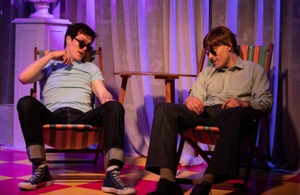Review: DIARY OF A SOMEBODY, Seven Dials Playhouse
Revival of play based on Joe Orton's diaries raises new questions

 You feel three generations of gay liberation (and catch a glimpse of a fourth, linked to race) in Nico Rao Pimparé's revival of John Lahr's play, Diary Of A Somebody.
You feel three generations of gay liberation (and catch a glimpse of a fourth, linked to race) in Nico Rao Pimparé's revival of John Lahr's play, Diary Of A Somebody.
There are the events of 1966, detailed in Joe Orton's diaries on which the play based, Lahr catching Orton's delight in transgression and his longtime boyfriend, Kenneth Halliwell's, plunge into depression. There's the 1989 original production of the play, when many of Orton's transgressions had been legalised, but prevailing attitudes were probably best summed up by Tom Robinson's line in 'Glad To Be Gay' - "The buggers are legal now, what more are they after?" And then 2022, when the moral panics that the letters LGBT excite in the media have tilted firmly to the T. with LGB largely met with a shrug of the shoulders if they warrant any reaction at all.
So, to borrow from Jorge Luis Borges, the exact same words sound very differently to different ears - this both diminishes and extends the appeal of the play.
Orton remains a compelling central character, George Kemp capturing his chutzpah, his humour, his confidence that never grew to curdle into arrogance. Orton, with the eye of a triple outsider (gay, working class and provincial) saw the absurdity in a London that wasn't quite swinging and skewered it.
Like most natural comics, he was cruel too and had a readymade punchbag in Halliwell, Toby Osmond (in a Michael Fabricant wig) channeling Ken's self-pity, his mental distress and his pain as Orton released a relentless stream of micro-aggressions. Sure they loved each other - so did Steptoe and Son - but Orton did terrible things to Halliwell before Halliwell did his shockingly terminal thing to Orton.
The other four members of the cast play a cavalcade of figures, famous and unknown, who breezed through Orton's life at the height of his short-lived fame. Jamie Zubairi delivers a deliciously camp Kenneth Williams, instantly recognised by many in the house a third of a century after his death. Jemma Churchill is terribly good reading the letters Joe wrote to the BBC to complain about... Orton of course! Sorcha Kennedy gives us a neighbour wholly unconcerned about Joe and Ken's lifestyle and fame - just preoccupied with the usual working class Londoner's worries. Ryan Rajah Mal nails the closeted, but also doomed. Brian Epstein, the Beatles' manager.
It's all well-trodden ground these days, but it still hurts knowing what fate awaits Joe, so full of life, and Ken, so trapped in his own neurosis, unable to arrest its descent into psychosis. But, as alluded to above, it's not all quite the same as it was.
I recall my father, a huge admirer of Kenneth Williams, reading and enjoying his diaries (not as explicit as Joe's of course) but remarking that the Tangier trips with Orton and Halliwell for "Beach, Boys and Bum" as Joe characteristically styles it, was "wrong". We've learned a lot more about 'White Privilege' in the 30 years since that conversation and I think I would agree with that conclusion more readily now.
Whether this 2022 reading adds complexity to the play or diminishes the freewheeling joie-de-vivre that we're invited to enjoy vicariously through Joe's free spirit - well, that's for you to decide. We can be pretty sure that Joe wouldn't care either way.
Reader Reviews

Videos

